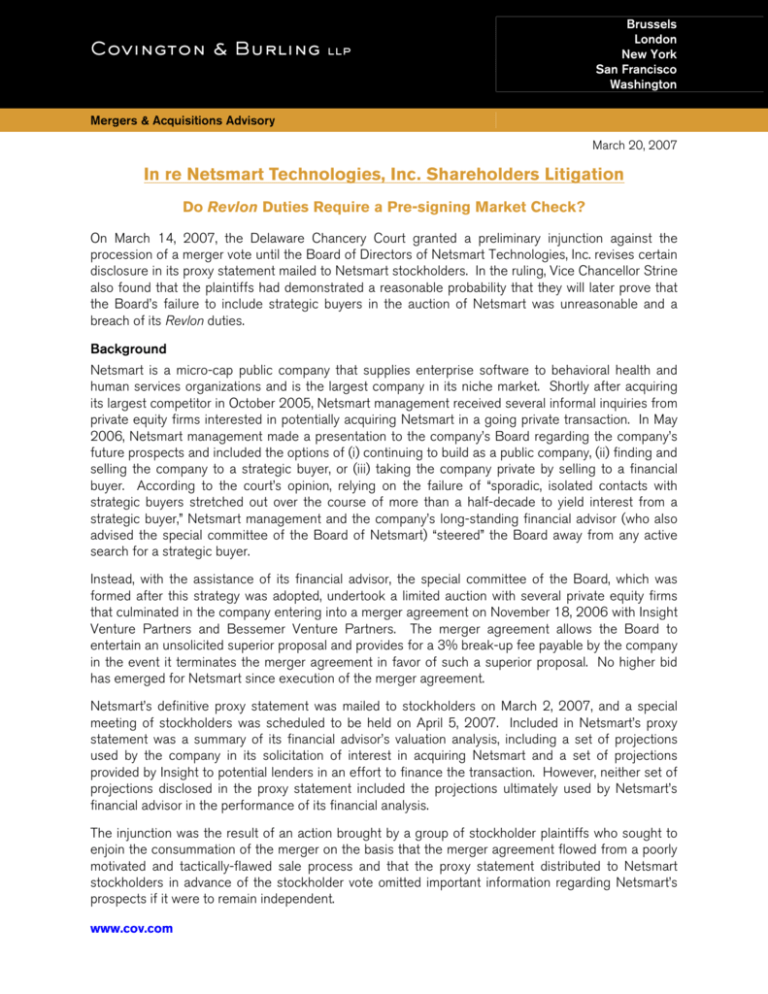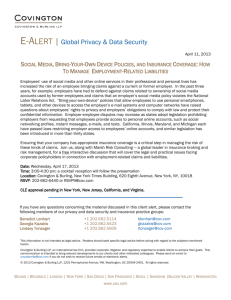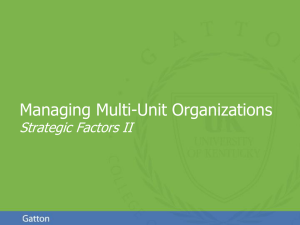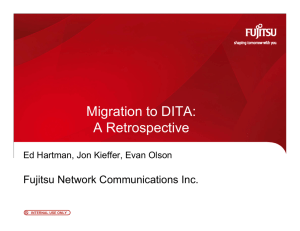
Covington & Burling
llp
Brussels
London
New York
San Francisco
Washington
Mergers & Acquisitions Advisory
March 20, 2007
In re Netsmart Technologies, Inc. Shareholders Litigation
Do Revlon Duties Require a Pre-signing Market Check?
On March 14, 2007, the Delaware Chancery Court granted a preliminary injunction against the
procession of a merger vote until the Board of Directors of Netsmart Technologies, Inc. revises certain
disclosure in its proxy statement mailed to Netsmart stockholders. In the ruling, Vice Chancellor Strine
also found that the plaintiffs had demonstrated a reasonable probability that they will later prove that
the Board’s failure to include strategic buyers in the auction of Netsmart was unreasonable and a
breach of its Revlon duties.
Background
Netsmart is a micro-cap public company that supplies enterprise software to behavioral health and
human services organizations and is the largest company in its niche market. Shortly after acquiring
its largest competitor in October 2005, Netsmart management received several informal inquiries from
private equity firms interested in potentially acquiring Netsmart in a going private transaction. In May
2006, Netsmart management made a presentation to the company’s Board regarding the company’s
future prospects and included the options of (i) continuing to build as a public company, (ii) finding and
selling the company to a strategic buyer, or (iii) taking the company private by selling to a financial
buyer. According to the court’s opinion, relying on the failure of “sporadic, isolated contacts with
strategic buyers stretched out over the course of more than a half-decade to yield interest from a
strategic buyer,” Netsmart management and the company’s long-standing financial advisor (who also
advised the special committee of the Board of Netsmart) “steered” the Board away from any active
search for a strategic buyer.
Instead, with the assistance of its financial advisor, the special committee of the Board, which was
formed after this strategy was adopted, undertook a limited auction with several private equity firms
that culminated in the company entering into a merger agreement on November 18, 2006 with Insight
Venture Partners and Bessemer Venture Partners. The merger agreement allows the Board to
entertain an unsolicited superior proposal and provides for a 3% break-up fee payable by the company
in the event it terminates the merger agreement in favor of such a superior proposal. No higher bid
has emerged for Netsmart since execution of the merger agreement.
Netsmart’s definitive proxy statement was mailed to stockholders on March 2, 2007, and a special
meeting of stockholders was scheduled to be held on April 5, 2007. Included in Netsmart’s proxy
statement was a summary of its financial advisor’s valuation analysis, including a set of projections
used by the company in its solicitation of interest in acquiring Netsmart and a set of projections
provided by Insight to potential lenders in an effort to finance the transaction. However, neither set of
projections disclosed in the proxy statement included the projections ultimately used by Netsmart’s
financial advisor in the performance of its financial analysis.
The injunction was the result of an action brought by a group of stockholder plaintiffs who sought to
enjoin the consummation of the merger on the basis that the merger agreement flowed from a poorly
motivated and tactically-flawed sale process and that the proxy statement distributed to Netsmart
stockholders in advance of the stockholder vote omitted important information regarding Netsmart’s
prospects if it were to remain independent.
www.cov.com
Covington & Burling
LLP
The Court’s Analysis
Largely at issue was whether the Board’s failure to engage in a marketing effort that included
strategic buyers violated the Board’s Revlon duties to undertake reasonable efforts to secure the
highest price realistically achievable given the market for the company. The defendants maintained
that the decision not to market to strategic buyers had been based on informal discussions with
potential strategic buyers that the company’s CEO had engaged in from the late 1990s to 2005 and
sporadic pitches that the company’s financial advisor had made to potential strategic buyers over the
same period.
The court found that these “erratic, unfocused, and temporally disparate” interactions with potential
strategic buyers that came at a time when Netsmart was much smaller and less established as a firm
were “hardly the stuff of a reliable market check” and were insufficient to satisfy the Board’s
obligations under Revlon. The court noted that key decision makers might have changed at the
potential strategic buyers over time and executives would be less likely to give serious consideration to
passing comments or cold calls than they would to more formal, concrete marketing efforts authorized
by the board of a company.
The defendants further argued that the inclusion of a break-up fee of 3% of the merger consideration
and a fiduciary out clause in the merger agreement that allowed the Board to ultimately accept a
superior proposal enabled a post-signing market check which obviated the need to market the
company to strategic buyers. Moreover, the lack of interest from strategic buyers after the
announcement of the merger appeared to support the initial conclusion of the Board that strategic
buyers were not interested in the company.
However, despite a post-signing market check being a generally accepted technique, the court was
not swayed that it was a reasonable strategy for Netsmart. The court emphasized that in the case of a
niche company like Netsmart, the potential utility of a sophisticated and targeted sales effort aimed at
strategic buyers would seem to be especially high. In distinguishing the facts in Netsmart from a postsigning market check in the context of a large-cap company, the court focused on the lack of market
attention in the micro-cap market, and the potentially high monetary and strategic costs associated
with a strategic buyer making a topping offer for a company after it had already signed a merger
agreement. The court also expressed doubt that a strategic buyer would expend much energy to top a
1
deal where the cost-benefit calculation was unfavorable.
The plaintiffs’ successful disclosure claim was based on Netsmart’s failure to include in the Proxy
Statement the 2010 and 2011 projections that were used by Netsmart’s financial advisor in
performing its discounted cash flow analysis. The defendants claimed that the 2010 and 2011
projections were not material because they had not been provided to potential purchasers and were
too speculative to require disclosure. However, the court held that these projections are material to
Netsmart’s stockholders in that Netsmart’s future prospects are directly relevant to the stockholders’
voting decision. The court further stressed that the company’s stockholders would find it important to
know what management’s and the company’s financial advisor’s best estimate of the company’s future
cash flows would be. The court noted that once a board broaches a topic in its disclosures, a duty
1
Although not at the heart of its decision, the court did express skepticism at the conduct of the special committee in its dealings with
Netsmart management and the private equity firms that did participate in the auction. In particular, the court noted that the special committee
(i) retained the company’s financial advisor with whom management had a long-standing relationship and (ii) allowed the Netsmart CEO
virtually unlimited access to their deliberations and let him direct the due diligence process without close oversight. The court also considered
the fact that Netsmart management, who desired to continue as executives and receive more equity, would almost certainly favor a financial
buyer and that the multiples implied by the merger with Insight were generally below the mean and median for comparable transactions.
www.cov.com
Page 2
Covington & Burling
LLP
attaches to provide information that is materially complete and unbiased by the omission of material
facts.
The court refused to enjoin the merger on the basis that such an injunction would give Insight and
Bessemer the right to terminate the deal. Instead, the court required that prior to a stockholder vote
on the merger, the company disclose to its stockholders the financial projections that had not been
included in the proxy statement and, with respect to the failure to market the company to strategic
buyers, the company either disclose the judicial decision or provide a balanced description of the
Board’s actions with regard to the possibility of finding strategic buyers.
Potential Implications
It has been a widely held view that Revlon duties per se do not require a company to conduct a presigning market check. Most practitioners and boards have taken comfort in the fact that a standard
“fiduciary out” and a reasonable break-up fee would afford an interested party with the opportunity to
make a superior proposal to acquire the company. What is most striking about the Netsmart decision
is that it arguably suggests that the board of a Delaware company (at least a micro-cap company) that
is in Revlon mode is obligated to auction the company prior to entering into a merger agreement. That
suggestion, which would be a dramatic shift in Delaware law, almost certainly reaches too far on the
strength of one case. Nevertheless, viewed in the context of a Delaware judiciary looking to reassert
the primacy of fiduciary principles in public company governance, the Netsmart decision has significant
implications for companies in sale mode and their acquirors.
Jack S. Bodner
Sean G. McAuliffe
*
*
*
This information is not intended as legal advice, which may often turn on specific facts. Readers should seek
specific legal advice before acting with regard to the subjects mentioned herein.
If you have any questions concerning the material discussed in this client
advisory, please contact any of the following attorneys:
Jack Bodner
Ken Ebanks
Peter Laveran-Stiebar
Will Phillips
Bruce Wilson
212.841.1079
415.591.7089
44.(0).20.7067.2021
212.841.1081
202.662.5400
jbodner@cov.com
kebanks@cov.com
plaveran@cov.com
cphillips@cov.com
bwilson@cov.com
Covington & Burling LLP is one of the world's preeminent law firms known for handling sensitive and important
client matters. This advisory is intended to bring breaking developments to our clients and other interested
colleagues in areas of interest to them. Please send an email to unsubscribe@cov.com if you do not wish to
receive future advisories.
© 2007 Covington & Burling LLP. All rights reserved.
www.cov.com
Page 3








